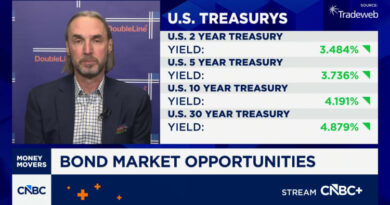Why aren’t Chinese consumers spending enough money?
Customers look at clothes advertising discounts of 80% or 70% in a supermarket in Hangzhou, Zhejiang province, China, on June 9, 2025.
Cfoto | Future Publishing | Getty Images
BEIJING — China’s consumer spending shows little sign of picking up soon, given uncertainty about future wealth, changing preferences and lack of a social safety net.
It’s been four straight months of declining consumer prices, consumer confidence is hovering near historic lows, and the real estate market is struggling to turn around. Analysts repeatedly point to one main factor: stagnant income.
Disposable income in China has halved its pace of growth since the pandemic hit in 2020, now growing only by an average of 5% a year, Jeremy Stevens, Beijing-based Asia economist at Standard Bank, said in a report Wednesday.
Most jobs aren’t giving much of a raise. Out of 16 sectors, only three — mining, utilities and information technology services — have seen wage growth exceed that of gross domestic product since 2020, he said.
Monthly business surveys for May showed contraction in the labor market across the board, especially as factories navigate U.S. tariffs. The unemployment rate among young people aged 16 to 24 and not in school remained high in April at 15.8%. The official jobless rate in cities has hovered around 5%.
A record high of 64% Chinese households said in the third quarter of 2024 that they would rather save money rather than spend or invest it, according to a quarterly survey by the People’s Bank of China.
While that moderated to 61.4% in the fourth quarter, according to the latest survey released in March, it reflected a trend of more than 60% of respondents preferring to save that’s been recorded since late 2023.
And for the respondents who planned to increase spending, education was the top category, followed by health care and tourism, according to the PBOC’s fourth-quarter survey released in March.
More than half of respondents viewed the job market as becoming more difficult or hard to tell.
People in China have been culturally inclined to save, especially since limited insurance coverage means individuals must often bear most of the cost of a hospital treatment, higher education and retirement. The real estate slump of the last few years has also weighed on spending since property accounts for most of household wealth in China.
One way to make people more willing to spend is to more than double pension payouts, by increasing the share of state assets paid to the Ministry of Finance, Luo Zhiheng, chief economist at Yuekai Securities, said in a note.
He added that increasing public holidays and offering services sector consumption vouchers could also help.
In the last few weeks, Chinese authorities have stepped up plans to further support employment and improve social welfare. But policymakers have avoided the mass cash handouts that the U.S. and Hong Kong gave residents to stimulate spending after the pandemic.
Coming out of the pandemic, analysts cautioned…






